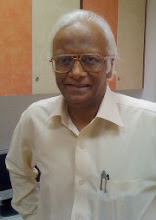 Television is for the rich
Television is for the richMuniba Kamal Musharrif, The News International’s columnist, talks to Creative Thinker.
“Is Media Jingoism fanning Indo-Pak tensions?” This was the topic hotly debated by five Pakistani and five Indian journalists at India International Centre (IIC) on Wednesday, April 15. A first timer amongst them was Muniba. After pouring her thoughts on the same in the panel discussion organized by Foundation for media professionals (FMC), we approached her for a chat.
Her lips widened in a warm smile. “Come let us sit and talk. Do you mind sitting there?” she asked directing her finger towards a table, “far from the maddening crowd.” Meanwhile she welcomes everyone approaching her (for a byte or an interview or just a chat) with a charming smile.
“Television represents only the rich and not the poor…” Don’t you think, even when poverty is made a part of television (big screen and small screen) only the evils of poverty have been focused?
Yes, but that is only our fault of overlooking their potential. In Pakistan, poverty is a part of the fabric of society. There is not much gap between the haves and the have-nots. Very rarely it so happens that poverty has been touched upon in television, the recent example being Slumdog Millionaire. But people in India have not rejoiced as much since a “foreigner” has made the movie. The reality of Dharavi, Asia’s largest slum, has not been portrayed by any Indian film-maker. We shun terrorists, but never try to find out why people turn to terrorism. Poor and illiterate, they have no goals in life. But it is our responsibility to reach out to them and make a difference.
How should poverty be shown in the media?
When I get a story and present it on television, people listen and connect. But people of our country respond even better to an Urdu channel than an English channel. Even if I am fluent in Urdu, there might be someone in a slum who can speak better Urdu and get better stories. But I have an edge socially and technologically. If only we can reach out to people from the slums, recognize their problems and provide them a platform where they can express their anxieties and real issues, then that will bring immense progress in both India and Pakistan.
How is Karachi as a city?
Karachi is to Pakistan what Mumbai is to India. Although Delhi is cleaner and more peaceful, Karachi is the heart of Pakistan.
How often have you been to India?
I am Karachi born and Karachi brought-up. I am really fond of Indian stars; people like Shahrukh Khan and Amitabh Bachchan rule the big screen. It is interesting to meet journalists from other parts of the world. We really can connect better.
“Is Media Jingoism fanning Indo-Pak tensions?” This was the topic hotly debated by five Pakistani and five Indian journalists at India International Centre (IIC) on Wednesday, April 15. A first timer amongst them was Muniba. After pouring her thoughts on the same in the panel discussion organized by Foundation for media professionals (FMC), we approached her for a chat.
Her lips widened in a warm smile. “Come let us sit and talk. Do you mind sitting there?” she asked directing her finger towards a table, “far from the maddening crowd.” Meanwhile she welcomes everyone approaching her (for a byte or an interview or just a chat) with a charming smile.
“Television represents only the rich and not the poor…” Don’t you think, even when poverty is made a part of television (big screen and small screen) only the evils of poverty have been focused?
Yes, but that is only our fault of overlooking their potential. In Pakistan, poverty is a part of the fabric of society. There is not much gap between the haves and the have-nots. Very rarely it so happens that poverty has been touched upon in television, the recent example being Slumdog Millionaire. But people in India have not rejoiced as much since a “foreigner” has made the movie. The reality of Dharavi, Asia’s largest slum, has not been portrayed by any Indian film-maker. We shun terrorists, but never try to find out why people turn to terrorism. Poor and illiterate, they have no goals in life. But it is our responsibility to reach out to them and make a difference.
How should poverty be shown in the media?
When I get a story and present it on television, people listen and connect. But people of our country respond even better to an Urdu channel than an English channel. Even if I am fluent in Urdu, there might be someone in a slum who can speak better Urdu and get better stories. But I have an edge socially and technologically. If only we can reach out to people from the slums, recognize their problems and provide them a platform where they can express their anxieties and real issues, then that will bring immense progress in both India and Pakistan.
How is Karachi as a city?
Karachi is to Pakistan what Mumbai is to India. Although Delhi is cleaner and more peaceful, Karachi is the heart of Pakistan.
How often have you been to India?
I am Karachi born and Karachi brought-up. I am really fond of Indian stars; people like Shahrukh Khan and Amitabh Bachchan rule the big screen. It is interesting to meet journalists from other parts of the world. We really can connect better.

No comments:
Post a Comment